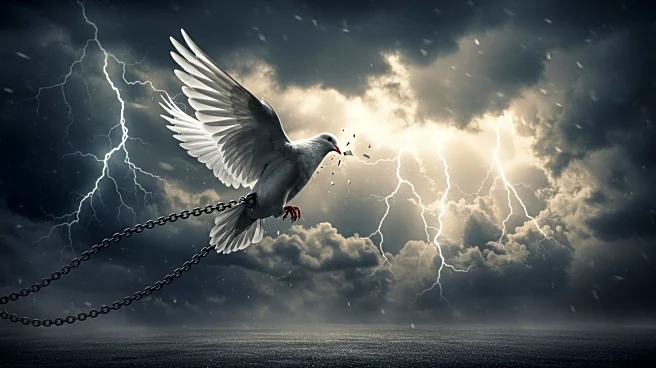What's Happening?
Israeli protesters have taken to the streets in one of the largest demonstrations in 22 months of conflict, demanding a deal to free hostages held in Gaza. The protests, organized by families of the hostages, saw hundreds of thousands of participants across the country. The demonstrators are expressing growing frustration over the Israeli government's plans for a new military offensive in Gaza, fearing it could further endanger the hostages. Prime Minister Benjamin Netanyahu faces pressure from various factions, including calls from former military and intelligence leaders to negotiate an end to the fighting. The protests included road blockades and bonfires, with police arresting 38 individuals. The situation is further complicated by the humanitarian crisis in Gaza, where malnutrition-related deaths have been reported.
Why It's Important?
The protests highlight the deepening public discontent with the Israeli government's handling of the Gaza conflict, particularly regarding the hostages' plight. The demonstrations could influence political dynamics within Israel, as Netanyahu balances pressures from his coalition and public opinion. The humanitarian situation in Gaza, with reports of starvation and malnutrition, adds urgency to calls for a resolution. The protests also reflect broader concerns about the impact of continued military actions on civilian populations and the potential for escalating violence. The international community is closely watching these developments, which could affect diplomatic relations and humanitarian aid efforts.
What's Next?
The Israeli government faces critical decisions regarding its military strategy in Gaza and the potential for negotiations to release hostages. Netanyahu's administration must navigate internal political pressures, including threats from far-right cabinet members. The protests may continue to grow, potentially influencing government policy and international responses. Humanitarian organizations are likely to increase calls for aid access to Gaza, while the United Nations monitors the situation closely. The possibility of further military offensives raises concerns about additional civilian casualties and displacement.
Beyond the Headlines
The protests in Israel may signal a shift in public sentiment towards the government's approach to the Gaza conflict, potentially leading to broader discussions on peace and security in the region. The humanitarian crisis in Gaza underscores the ethical and moral challenges faced by both sides in the conflict. Long-term implications could include changes in Israeli domestic policy and international diplomatic strategies, as well as increased advocacy for human rights and humanitarian aid.










